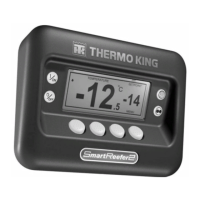Section 1 – SR-2 Safety Information
GENERAL PRACTICES
1. Always wear goggles or safety glasses.
Refrigerant and battery acid can permanently
damage the eyes.
2. Never close the compressor discharge service
valve with the unit running. Never operate the
unit with the discharge service valve closed.
3. Keep hands, clothing and tools clear of fans and
belts when the unit is running.
4. Be sure gauge manifold hoses are in good
condition. Never let them come in contact with
belts, fans, pulleys or hot surfaces.
5. Never apply heat to a sealed refrigeration
system or container.
6. Refrigerants in the presence of an open flame
produce toxic gases. These gases are severe
respiratory irritants capable of causing death.
7. Be sure all mounting bolts are the correct length
for the application and are securely tightened.
8. Use extreme caution when drilling holes in the
unit. Holes may weaken structural components.
Holes drilled into wiring can cause fire or
explosion. Holes drilled into the refrigeration
system will release refrigerant.
9. Use caution when working around exposed coil
fins. These fins can cause painful lacerations.
10. Use caution when working with refrigerant in a
closed or confined area with a limited air supply
such as a trailer, truck, container or hold of a
ship. Refrigerant tends to displace air and can
cause oxygen depletion. This may result in
unconsciousness or death due to suffocation.
AUTO START/STOP
CAUTION:
The unit may start and run automatically,
and at any time, when the unit is turned
"on”. Units start automatically in both Cycle
Sentry mode and Continuous mode. Be
sure to turn the unit Microprocessor On/Off
switch "off" before opening doors,
inspecting or working on any part of the
unit.
REFRIGERANT
At Thermo King we recognize the need to
preserve the environment and limit the potential
harm to the ozone layer that can result from
allowing refrigerant to escape into the
atmosphere.
We strictly adhere to a policy that promotes the
recovery and limits the loss of refrigerant into
the atmosphere.
When working on transport refrigeration
systems, a recovery process that prevents or
minimizes refrigerant loss to the atmosphere is
required by law. In addition, service personnel
must be aware of the appropriate European
1-3
18 January 2005

